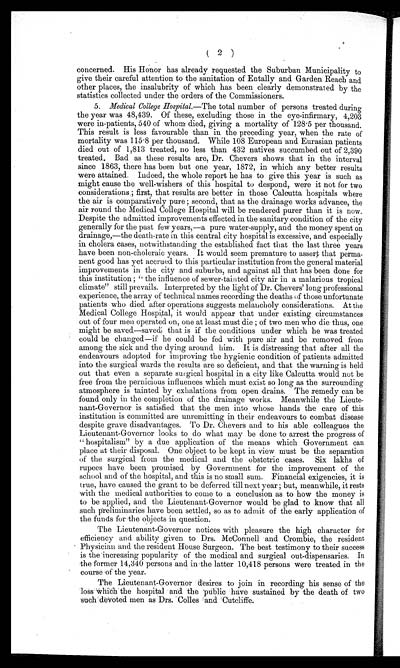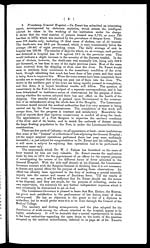Medicine - Institutions > Reports from medical colleges, schools and research institutions > Report on the Calcutta medical institutions > Calcutta medical institutions reports 1871-78 > Report on the Calcutta Medical Institutions for the year 1873
(415) Page 2
Download files
Individual page:
Thumbnail gallery: Grid view | List view

( 2)
concerned. His Honor has already requested the Suburban Municipality to
give their careful attention to the sanitation of Entally and Garden Reach and
other places, the insalubrity of which has been clearly demonstrated by the
statistics collected under the orders of the Commissioners.
5. Medical College Hospital.—The total number of persons treated during
the year was 48,439. Of these, excluding those in the eye-infirmary, 4,203
were in-patients, 540 of whom died, giving a mortality of 128.5 per thousand.
This result is less favourable than in the preceding year, when the rate of
mortality was 115.8 per thousand. While 108 European and Eurasian patients
died out of 1,813 treated, no less than 432 natives succumbed out of 2,390
treated. Bad as these results are, Dr. Chevers shows that in the interval
since 1863, there has been but one year, 1872, in which any better results
were attained. Indeed, the whole report he has to give this year is such as
might cause the well-wishers of this hospital to despond, were it not for two
considerations; first, that results are better in those Calcutta hospitals where
the air is comparatively pure; second, that as the drainage works advance, the
air round the Medical College Hospital will be rendered purer than it is now.
Despite the admitted improvements effected in the sanitary condition of the city
generally for the past few years,—a pure water-supply, and the money spent on
drainage,—the death-rate in this central city hospital is excessive, and especially
in cholera cases, notwithstanding the established fact that the last three years
have been non-choleraic years. It would seem premature to assert that perma-
nent good has yet accrued to this particular institution from the general material
improvements in the city and suburbs, and against all that has been done for
this institution; " the influence of sewer-tainted city air in a malarious tropical
climate" still prevails. Interpreted by the light of Dr. Chevers' long professional
experience, the array of technical names recording the deaths of those unfortunate
patients who died after operations suggests melancholy considerations. At the
Medical College Hospital, it would appear that under existing circumstances
out of four men operated on, one at least must die; of two men who die thus, one
might be saved—saved; that is if the conditions under which he was treated
could be changed—if he could be fed with pure air and be removed from
among the sick and the dying around him. It is distressing that after all the
endeavours adopted for improving the hygienic condition of patients admitted
into the surgical wards the results are so deficient, and that the warning is held
out that even a separate surgical hospital in a city like Calcutta would not be
free from the pernicious influences which must exist so long as the surrounding
atmosphere is tainted by exhalations from open drains. The remedy can be
found only in the completion of the drainage works. Meanwhile the Lieute-
nant-Governor is satisfied that the men into whose hands the care of this
institution is committed are unremitting in their endeavours to combat disease
despite grave disadvantages. To Dr. Chevers and to his able colleagues the
Lieutenant-Governor looks to do what may be done to arrest the progress of
"hospitalism" by a due application of the means which Government can
place at their disposal. One object to be kept in view must be the separation
of the surgical from the medical and the obstetric cases. Six lakhs of
rupees have been promised by Government for the improvement of the
school and of the hospital, and this is no small sum. Financial exigencies, it is
true, have caused the grant to be deferred till next year; but, meanwhile, it rests
with the medical authorities to come to a conclusion as to how the money is
to be applied, and the Lieutenant-Governor would be glad to know that all
such preliminaries have been settled, so as to admit of the early application of
the funds for the objects in question.
The Lieutenant-Governor notices with pleasure the high character for
efficiency and ability given to Drs. McConnell and Crombie, the resident
Physician and the resident House Surgeon. The best testimony to their success
is the increasing popularity of the medical and surgical out-dispensaries. In
the former 14,340 persons and in the latter 10,418 persons were treated in the
course of the year.
The Lieutenant-Governor desires to join in recording his sense of the
loss which the hospital and the public have sustained by the death of two
such devoted men as Drs. Cones and Cutcliffe.
Set display mode to: Large image | Zoom image | Transcription
Images and transcriptions on this page, including medium image downloads, may be used under the Creative Commons Attribution 4.0 International Licence unless otherwise stated. ![]()
| Permanent URL | https://digital.nls.uk/74974133 |
|---|
| Description | 13 titles. Describes research work and conditions, treatments, vaccine production, medical education, public health and disease outbreaks. Extensive tables show mortality rates and patient admissions. These - some from asylums, jails, dispensaries, civil and police hospitals – will be useful to epidemiologists. |
|---|



![[Page 1]](https://deriv.nls.uk/dcn4/7497/74974132.4.jpg)
